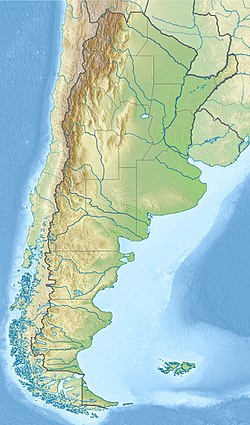Coli Toro Member
Appearance
(Redirected from Coli Toro Formation)
| Coli Toro Member | |
|---|---|
| Stratigraphic range: Campanian | |
| Type | Member |
| Unit of | Los Alamitos Formation |
| Overlies | Angostura Colorada Formation |
| Lithology | |
| Primary | Sandstone |
| Location | |
| Coordinates | 41°00′S 69°30′W / 41.0°S 69.5°W |
| Approximate paleocoordinates | 43°36′S 55°24′W / 43.6°S 55.4°W |
| Region | Río Negro Province |
| Country | Argentina |
| Extent | Neuquén Basin |
The Coli Toro Member is a Campanian geologic member in Argentina. Dinosaur remains are among the fossils that have been recovered from the formation, although none have yet been referred to a specific genus.[1] The sandstones of the formation were deposited in a lacustrine environment.
The formation in later publications has been reassigned as the Coli Toro Member at the basal levels of the Los Alamitos Formation, containing fossil remains of Sulcusuchus erraini.[2] The formation partly overlies the Angostura Colorada Formation.[3]
See also
[edit]References
[edit]- ^ Weishampel, et al. (2004). "Dinosaur distribution." Pp. 517-607.
- ^ Cari-Laufqen Grande Pond at Fossilworks.org
- ^ Ottone, 2009, p.377
Bibliography
[edit]- Ottone, Eduardo G (2009), "La flora cretácica de Cuenca Neuquina, su significado paleoambiental y paleoclimático" (PDF), Revista de la Asociación Geológica Argentina, 65: 373–386, retrieved 2018-09-08
- Weishampel, David B.; Dodson, Peter; Osmólska, Halszka (2004), The Dinosauria, 2nd edition, Berkeley: University of California Press, pp. 1–880, ISBN 0-520-24209-2, retrieved 2019-02-21
Further reading
[edit]- R. M. Casamiquela. 1964. Sobre un dinosaurio hadrosáurido de la Argentina. Ameghiniana 3(9):285-312
- J. O'Gorman and Z. Gasparini. 2013. Revision of Sulcusuchus erraini (Sauropterygia, Polycotylidae) from the Upper Cretaceous of Patagonia, Argentina. Alcheringa 37(2):163-176

